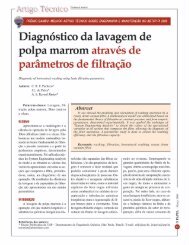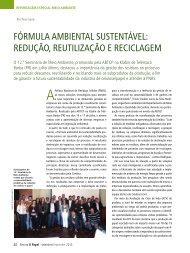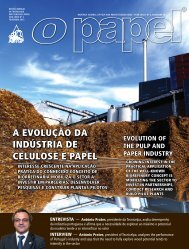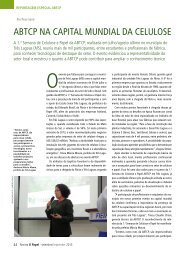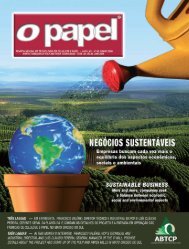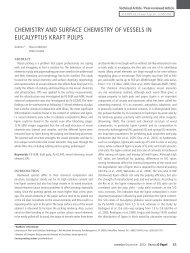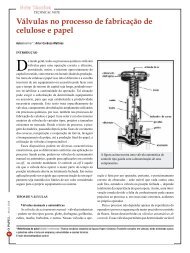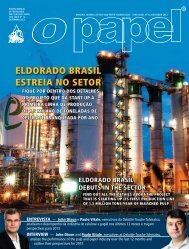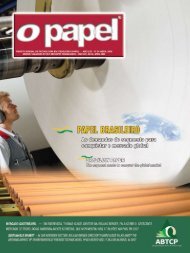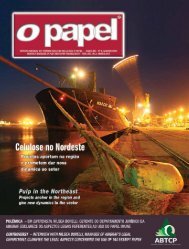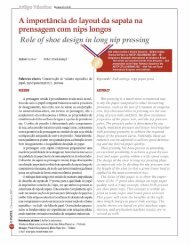Conhecimento é poder. - Revista O Papel
Conhecimento é poder. - Revista O Papel
Conhecimento é poder. - Revista O Papel
Create successful ePaper yourself
Turn your PDF publications into a flip-book with our unique Google optimized e-Paper software.
Recommended<br />
reading<br />
I suggest you read the<br />
book Enterprising Nation<br />
with great attention and<br />
reflect about the<br />
application of so much<br />
rich and interesting<br />
principles (principles,<br />
once more) in<br />
our companies.<br />
authorities. Getting the resources is rarely a problem, if<br />
a good planning is prepared.<br />
Complementing this consideration, I like to<br />
mention the Ketan Tripod: Objectives Principles <br />
Power. The evolution of this reasoning shows us that<br />
the “Power” factor has a sophisticate component,<br />
the capital availability. And capital is also power.<br />
However, if the “Principles” factor does not work,<br />
it is useless to have objectives, neither helps to have<br />
the capital, because there will be no power, due to<br />
the lack of conditions for practicing it. Fragility in the<br />
“Principles” topic spoils everything.<br />
PRINCIPLES - CULTURE OF RIGOR<br />
AND DELIVERY CAPACITY<br />
When analyzing the reasons for failure and success<br />
of many events, we clearly notice what we call<br />
presence or absence of the culture of rigor.<br />
We are used to talk about Human Capital as the<br />
solution for many industry problems. When discussing<br />
the matter with Dr. Deise Grisolia, a specialist in this<br />
field, we find a much more sophisticate thought.<br />
What is being pursued is the evolution of the<br />
“Human Capital” concept as human resource <br />
“Intelligence Capital” as a skill for promoting<br />
improvements in work environment “Social<br />
Capital” as a skill for the real team work “Honor<br />
and Delivery Capital” as a skill for seriously meet<br />
commitments and contracts.<br />
The “Principles” factor is naturally linked to this<br />
latter stage of human capital evolution. It is clear<br />
that meeting the commitments is linked to a certain<br />
order between operation and action. Operation<br />
principles prevail. What else is missing<br />
BUILDING THE SUCCESS<br />
During 2010, we had, at the Knowledge Center<br />
(Centro do <strong>Conhecimento</strong>), located at the Regional<br />
Administration Council of São Paulo (Conselho<br />
Regional de Administração de São Paulo), an<br />
extremely interesting experience. It relates<br />
to attaining the convergence of professional<br />
contributions of engineers, physicists, chemists,<br />
lawyers, administrators, medical doctors,<br />
sociologists, psychoanalysts, psychiatrists and<br />
several other professions, in order to conquer well<br />
defined objectives.<br />
The convergence of multidisciplinary<br />
contributions allowed for amazing results. For<br />
example, an important proposal for improving<br />
the performance of the health sector was born<br />
there and is on its way to become a practical<br />
procedure. What is the basic fundament for this<br />
success It comprises the established objectives,<br />
multidisciplinary convergence, leadership by<br />
shared learning, absence of hierarchy and support<br />
of the status of respect among all. Respect and<br />
confidence: something that cannot miss.<br />
ISRAEL AND THE IMPORTANCE OF WHAT<br />
WAS PRACTICED IN THE KNOWLEDGE CENTER<br />
I had, recently, the opportunity of attending<br />
the lecture of Saul Singer, one of the authors of<br />
the book Enterprising Nation, published by Évora,<br />
where he writes about Israel economic miracle<br />
and what this teaches us. Saul Singer talks<br />
about the capacity of making things happen, the<br />
“Delivery Capacity”, the expression we use in our<br />
speeches. Overcoming challenges, overcoming<br />
lack of resources, high quality innovations, dozens<br />
of Nobel awards, courage, among other matters,<br />
are the spices of history. But the background is<br />
the same phenomenon that we experience in the<br />
Center of Knowledge (Centro do <strong>Conhecimento</strong>).<br />
We live a historical moment, in which the<br />
“simple entities” of the past became “complex<br />
entities”. Famous sentence attributed to Henry<br />
Ford. “I make cars of any color, as far as they are<br />
black.” Historical moment of the simple. But let´s<br />
remember that when the historical moment became<br />
complex, the portfolio of products of a car maker<br />
had hundreds of options and colors.<br />
Any work proposal, any new product or service<br />
creation may comprise hundreds of variables<br />
which may escape from the understanding of<br />
teams that do not rely on the proposal of the offer<br />
of knowledge multiplicity. When we discussed<br />
this kind of solution of convergence of multiple<br />
knowledges, an objection came up immediately:<br />
the requirement of too much resource, it is too<br />
expensive. Great mistake!<br />
The first characteristic of this type of teamwork<br />
is the speed of response. Time is money. The second<br />
characteristic is the anticipation of problems that<br />
were later discovered; the problems that would<br />
delay the implementation of the proposals and<br />
make the costs higher. We are living the times of<br />
breaking paradigms... •<br />
64 <strong>Revista</strong> O <strong>Papel</strong> - junho/june 2011



